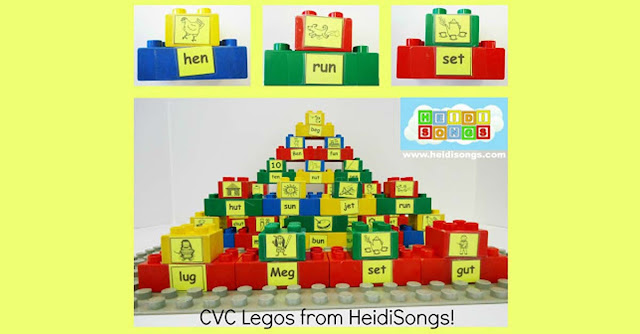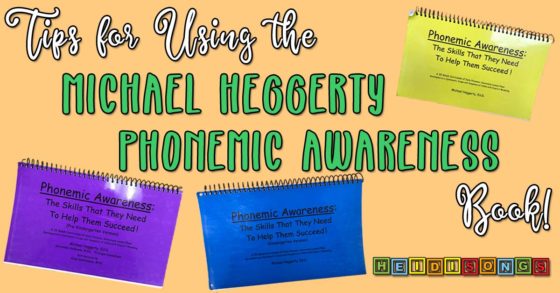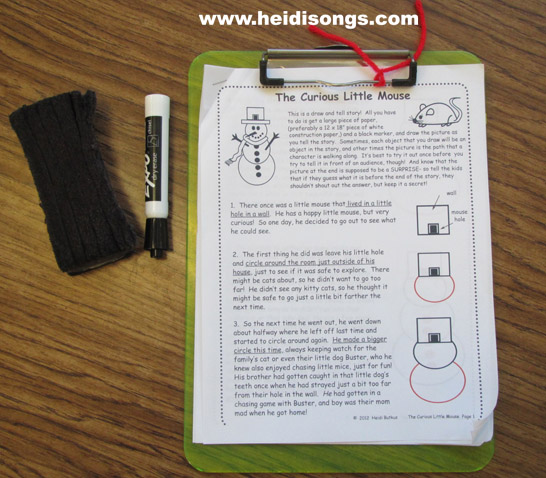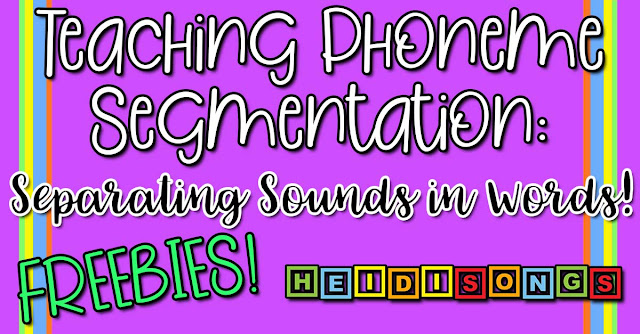Common Core Literacy Centers: CVC Legos!
Have you heard the news? We've Moved to HeidiSongs.tv!
Our new website features an online video streaming service, updated blog posts at Heidisongs.blog, and a wealth of fresh resources designed to make learning even more fun and engaging.
You can also continue shopping for our educational products there and at our Teachers Pay Teachers store!
Head over to HeidiSongs.tv now and explore all the exciting new features.
See you there!
__________________________________________________________________________
Today I am going to tell you about a very simple idea that I call CVC Legos! These CVC Legos make a great literacy center activity for children to practice reading and matching CVC (consonant-vowel-consonant) words to their pictures, which is a Common Core skill.
Meanwhile, I have to tell you that last weekend I presented at the International Reading Association Conference in San Antonio, Texas, and it was an absolute blast and a fabulous experience! I met people from all over the world, and BOTH of my sessions were completely FULL!

Nothing is better to a presenter than a full session!
I love it when that happens because there is so much energy in the room, and I feel so appreciated! Plus, there were lots of wonderful teachers that came up and thanked me for “all of my hard work and valuable information.” And that makes all of the time I have spent on all of this stuff worthwhile!

Ah, the famous San Antonio RiverWalk is lovely!
I also got to hear the author Mo Willems speak at the closing general session of the conference. What a thrill! I can’t wait to try out his guided drawing lesson of the pigeon with my students! I think that we may just try to draw his elephant and piggie as well. I’m hoping to share this with you next week.

Remember the Alamo? And just LOOK at that beautiful sky!
And now, back to the CVC Legos! Well, in reality, they were CVC Duplos, because Lego blocks are so small that it would have been even harder to get the words and pictures on the blocks! To make them, I just used some Duplo blocks that were being used infrequently in my classroom.

I printed out some CVC Student Flash Cards from my CVC book at a reduced size. I printed out one page at a 50% reduction in size, which was easy on the print dialog on my Mac. I am not sure how to do this on a PC or how to print a page out at a reduced size using Microsoft Word, so I guess that is something you will have to figure out on your own! Sorry- I’m a Mac, not a PC!

After printing, I cut out one flash card to see if it would fit on the blocks I had. As best I can recall, the 50% reduction was not quite enough, and I had to go for about 35%. I’m sorry that I don’t remember exactly what the percentage of reduction was, but it has been a while since I made them! My best advice is to print out just one page, and measure the flash card to the block, and see if it will fit. If so, then proceed. Once you have the size correct, just cut them out and tape them on! If you are new to my blog, and haven’t yet downloaded our free sample of the CVC book, then you can do so here!

Remember, any type of blocks or toys that snap together can be used for this activity, so you might want to check around your classroom or garage sales for old toy sets that you might be able to change into a literacy manipulative.
For example, by printing out different words and some punctuation, we could have also snapped together sentences! So here are some other ideas that this type of thing could work for:
* Sentences (as described above)
* Compound words
* Contractions (the shortened version on top, and the long version with two words on the bottom.)
* Sight words (match a sight words in one font to another.)
* Sort and snap together words that belong to the same word families
* Antonyms (opposites)
* Homonyms (words that sound the same but mean different things)
Some things to think about:
It can be tough to keep kids on task when they are supposed to be “working” with toys! You may need to offer some incentives to get them to complete the work that you want them to do and hold them accountable for it. My favorite way of doing this is to promise to take a picture of their structures if they put the whole thing together! My kids usually like this and are happy to do “the work” in exchange for posing for a picture.

Another way to do this is to give the children a recording sheet of some kind, where they have to write down the words as they find them. I did not create one, though, because my kids didn’t seem to need one. Also, completing this task took quite a while (at least 10-15 minutes) for two children working together, WITHOUT doing any recording sheets. If I had given them any recording sheets to complete, they probably wouldn’t have finished them. I think that the reason it took so long is because I included two complete word families from my CVC book, so that is probably about 18-20 words. That means that the children were sorting through nearly forty blocks to find the ones that they wanted! So no wonder it took so long. I’m sure it would have been a more reasonable activity with just one word family, but then there would have also been less to build with.

This is what it looked like when we added in the letters on the Duplo blocks with the CVC flash cards.
When I first gave them this activity, I also put some white letter stickers on some Duplo blocks as well, and they were supposed to spell each word as well. This meant that the children had three more blocks for every word that they had to search through to find each block that they needed, for a total of about 100 blocks! I can tell you that this was FAR too overwhelming for the children, and if I had given this ANY reasonable thought at all, I would have realized that there were going to be WAY too many blocks! Below is a picture of what the activity looked like with the letter blocks included as well; I printed them on return address stickers.
I wouldn’t do the activity again this way, but if you would still like to download these letter stickers, please click here. I have included the letters you would need for both the short U and the short E word families from my CVC book. You may choose to give your students just the letter blocks, or use them in a different way, etc., so I may as well pass them along!

I’m not crazy about the idea of the kids building words vertically… but that was their preferred method of building until I took away the letter blocks. And notice the spelling of the word “egg” in the photo. LOL!
If you know of another way to keep kids on task when doing an instructional activity that includes toys, please leave a comment and let me know!
If you would like to hear some songs to help your kids learn to sound out CVC words, click here!
And I would like to give a big shout out to Mrs. Titus class from Evansville, IN for writing me a wonderful notebook FULL of letters, telling me what their favorite HeidiSong is! And I absolutely LOVE this photo that Mrs. Titus put on the cover of the book. It’s just beautiful. Thank you!

Thank you so much, Mrs. Titus’ class from Evansville, IN!
----------------------------------
Follow me! Did you enjoy this post? Do me a favor and share it with your friends! And follow this blog by signing up for my email updates here, or follow on Bloglovin', or follow me on TPT! I'm also on Pinterest, Facebook, Twitter, Instagram, Google+ and YouTube, too! Don't forget to sign up for our email newsletter for special deals and promo codes that you won't find out about anywhere else.
Meanwhile, I have to tell you that last weekend I presented at the International Reading Association Conference in San Antonio, Texas, and it was an absolute blast and a fabulous experience! I met people from all over the world, and BOTH of my sessions were completely FULL!

I love it when that happens because there is so much energy in the room, and I feel so appreciated! Plus, there were lots of wonderful teachers that came up and thanked me for “all of my hard work and valuable information.” And that makes all of the time I have spent on all of this stuff worthwhile!

I also got to hear the author Mo Willems speak at the closing general session of the conference. What a thrill! I can’t wait to try out his guided drawing lesson of the pigeon with my students! I think that we may just try to draw his elephant and piggie as well. I’m hoping to share this with you next week.

And now, back to the CVC Legos! Well, in reality, they were CVC Duplos, because Lego blocks are so small that it would have been even harder to get the words and pictures on the blocks! To make them, I just used some Duplo blocks that were being used infrequently in my classroom.

I printed out some CVC Student Flash Cards from my CVC book at a reduced size. I printed out one page at a 50% reduction in size, which was easy on the print dialog on my Mac. I am not sure how to do this on a PC or how to print a page out at a reduced size using Microsoft Word, so I guess that is something you will have to figure out on your own! Sorry- I’m a Mac, not a PC!

After printing, I cut out one flash card to see if it would fit on the blocks I had. As best I can recall, the 50% reduction was not quite enough, and I had to go for about 35%. I’m sorry that I don’t remember exactly what the percentage of reduction was, but it has been a while since I made them! My best advice is to print out just one page, and measure the flash card to the block, and see if it will fit. If so, then proceed. Once you have the size correct, just cut them out and tape them on! If you are new to my blog, and haven’t yet downloaded our free sample of the CVC book, then you can do so here!

Remember, any type of blocks or toys that snap together can be used for this activity, so you might want to check around your classroom or garage sales for old toy sets that you might be able to change into a literacy manipulative.
For example, by printing out different words and some punctuation, we could have also snapped together sentences! So here are some other ideas that this type of thing could work for:
* Sentences (as described above)
* Compound words
* Contractions (the shortened version on top, and the long version with two words on the bottom.)
* Sight words (match a sight words in one font to another.)
* Sort and snap together words that belong to the same word families
* Antonyms (opposites)
* Homonyms (words that sound the same but mean different things)
Some things to think about:
It can be tough to keep kids on task when they are supposed to be “working” with toys! You may need to offer some incentives to get them to complete the work that you want them to do and hold them accountable for it. My favorite way of doing this is to promise to take a picture of their structures if they put the whole thing together! My kids usually like this and are happy to do “the work” in exchange for posing for a picture.

Another way to do this is to give the children a recording sheet of some kind, where they have to write down the words as they find them. I did not create one, though, because my kids didn’t seem to need one. Also, completing this task took quite a while (at least 10-15 minutes) for two children working together, WITHOUT doing any recording sheets. If I had given them any recording sheets to complete, they probably wouldn’t have finished them. I think that the reason it took so long is because I included two complete word families from my CVC book, so that is probably about 18-20 words. That means that the children were sorting through nearly forty blocks to find the ones that they wanted! So no wonder it took so long. I’m sure it would have been a more reasonable activity with just one word family, but then there would have also been less to build with.

When I first gave them this activity, I also put some white letter stickers on some Duplo blocks as well, and they were supposed to spell each word as well. This meant that the children had three more blocks for every word that they had to search through to find each block that they needed, for a total of about 100 blocks! I can tell you that this was FAR too overwhelming for the children, and if I had given this ANY reasonable thought at all, I would have realized that there were going to be WAY too many blocks! Below is a picture of what the activity looked like with the letter blocks included as well; I printed them on return address stickers.
I wouldn’t do the activity again this way, but if you would still like to download these letter stickers, please click here. I have included the letters you would need for both the short U and the short E word families from my CVC book. You may choose to give your students just the letter blocks, or use them in a different way, etc., so I may as well pass them along!

If you know of another way to keep kids on task when doing an instructional activity that includes toys, please leave a comment and let me know!
If you would like to hear some songs to help your kids learn to sound out CVC words, click here!
And I would like to give a big shout out to Mrs. Titus class from Evansville, IN for writing me a wonderful notebook FULL of letters, telling me what their favorite HeidiSong is! And I absolutely LOVE this photo that Mrs. Titus put on the cover of the book. It’s just beautiful. Thank you!

----------------------------------
Follow me! Did you enjoy this post? Do me a favor and share it with your friends! And follow this blog by signing up for my email updates here, or follow on Bloglovin', or follow me on TPT! I'm also on Pinterest, Facebook, Twitter, Instagram, Google+ and YouTube, too! Don't forget to sign up for our email newsletter for special deals and promo codes that you won't find out about anywhere else.










